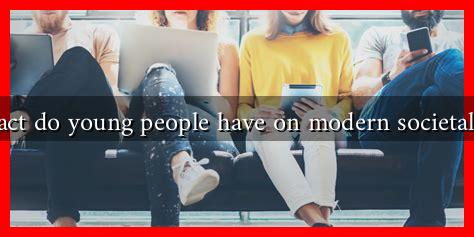-
Table of Contents
What Impact Do Young People Have on Modern Societal Standards?
In recent years, the influence of young people on societal standards has become increasingly evident. As digital natives, they are reshaping cultural norms, values, and expectations across various domains, including fashion, technology, politics, and social justice. This article explores the multifaceted impact of youth on modern societal standards, highlighting their role as catalysts for change and innovation.
The Digital Revolution and Social Media Influence
One of the most significant ways young people are impacting societal standards is through their engagement with digital platforms. Social media has become a powerful tool for self-expression and activism, allowing youth to voice their opinions and mobilize for change.
- Activism: Movements like #BlackLivesMatter and #MeToo have gained momentum largely due to the efforts of young activists who utilize social media to raise awareness and drive action.
- Fashion Trends: Platforms like Instagram and TikTok have enabled young influencers to set new fashion standards, often prioritizing sustainability and inclusivity over traditional luxury brands.
- Consumer Behavior: Young consumers are increasingly demanding transparency and ethical practices from brands, pushing companies to adopt more socially responsible practices.
Shaping Political Discourse
Young people are not just passive consumers of information; they are active participants in political discourse. Their engagement in politics is reshaping societal standards regarding civic responsibility and activism.
- Voter Turnout: According to the U.S. Census Bureau, voter turnout among 18- to 29-year-olds increased significantly in the 2020 elections, highlighting their growing political engagement.
- Policy Advocacy: Issues such as climate change, gun control, and education reform are often championed by young activists, influencing policymakers to consider their perspectives.
- Representation: The rise of young politicians, such as Alexandria Ocasio-Cortez and Ilhan Omar, reflects a shift towards more diverse and representative leadership.
Redefining Social Norms and Values
Young people are also instrumental in redefining social norms and values, particularly around issues of identity, gender, and mental health.
- Gender Fluidity: The acceptance of non-binary and gender-fluid identities has gained traction among younger generations, challenging traditional gender norms.
- Mental Health Awareness: Young people are more open about discussing mental health issues, reducing stigma and promoting a culture of support and understanding.
- Diversity and Inclusion: There is a growing emphasis on diversity in media, workplaces, and educational institutions, driven by the demand for representation from younger demographics.
Case Studies: Youth-Led Initiatives
Several youth-led initiatives exemplify the profound impact young people have on societal standards. For instance:
- Greta Thunberg and Climate Activism: The Swedish teenager’s “Fridays for Future” movement has mobilized millions worldwide, pressuring governments to take action on climate change.
- March for Our Lives: Following the tragic shooting at Marjory Stoneman Douglas High School, students organized a nationwide march advocating for gun control, significantly influencing public opinion and policy discussions.
Conclusion: The Future is Youth-Driven
In conclusion, young people are not just passive observers of societal change; they are active agents shaping modern standards across various domains. Their influence is evident in the realms of digital communication, political engagement, and the redefinition of social norms. As they continue to challenge the status quo and advocate for progressive values, it is clear that the future of societal standards will be increasingly youth-driven. The implications of this shift are profound, suggesting a more inclusive, equitable, and sustainable society.
For further reading on the impact of youth on societal standards, you can explore resources from organizations like Youth.gov and UNICEF’s Youth Engagement.

